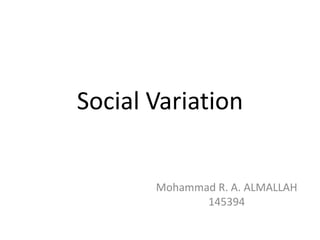
social variation ( dialects and accents)
- 1. Social Variation Mohammad R. A. ALMALLAH 145394
- 2. RP (Received Pronunciation) : a social accent: It is the accent of the best educated and the most prestigious members of English society. The label derives from the accent which was “received” at the royal court. The RP was promoted by the BBC for decades. It is a social accent not a regional one, and it conceals a speaker’s regional origin.
- 4. Social dialects Dialects are linguistic varieties which are distinguishable by their vocabulary, grammar and pronunciation; the speech of people from different social, as well as regional, groups may differ in these ways.
- 5. Standard English Is a social dialect. Standard English is more accommodating than RP, and allows for some variation within its boundaries. It is estimated that up to 15 percent of the British regularly use standard British English. In Standard English, a limited amount of grammatical variation is acceptable.
- 6. Non standard dialects: Any linguistic form that is not a part of Standard English is regarded as “non- standard”. The standard dialect is the first to be codified, so other dialects are always compared to the standard dialect.
- 7. Non standard is a term that gives negative connotations. This is because the term is related to the less prestigious classes. But we must understand that there is nothing regarded as bad or inferior in linguistics. Therefore, linguistically speaking these non standard forms are regarded as different. Some sociolinguists use the term “vernacular” rather than “non standard” to avoid any negative implication.
- 8. Vernacular forms have features that differ from those of the standard forms. They tend to be learnt at home and used in informal and casual contexts. Vernacular dialects, like vernacular languages, lack public or overt prestige although they are valued by their users, especially as a means of expressing solidarity.
- 9. Caste dialects People can be grouped together on the basis of similar social and economic factors. People’s languages reflect their social grouping when they use different social dialects. Social dialects can be seen clearly in Indonesia or India where social groupings are very clear. In these countries there area caste systems determined by birth, and strict social rules govern the behavior of each group. These rules govern matters like job, marriage and dressing. These social distinctions are also reflected in speech, and a person’s social dialect reflects his social background.
- 10. Social Class dialects • The term (social class) refers to a group of people who share similarities in economic and social status. Status differences are in relation to (family background, wealth, education). • There is a strong relationship between social class and language patter, and that’s why people of different social classes do not speak the same way.
- 11. On the level of vocabulary: • For example, in England there were words that marked the upper class English people (U speakers) from the (non U speakers). For example, (U speakers) used “sitting room” rather than “lounge”. They used “bag” instead of “Hand bag”.. However, the barriers between social groups are not fixed, because you can move up or down the social ladder. This is because the choice of vocabulary is superficial and can conceal/ hide social class membership.
- 12. On the level of pronunciation: • the speech of different social groups is distinguished by frequency which they use particular features. • The same linguistic variable is likely to have different values in different speech communities. • New York: /r/ is pronounced more by higher social classes. • England: /r/ is pronounced less by higher social classes.
- 13. On the level of grammatical patterns • There is also a variable that prove social grouping. The higher social groups use more of the standard grammatical forms and few of non-standard or vernacular forms. For example, the Standard English would use “she walks every day”, “I finished my homework”, while the vernacular would use “ she walk” and “I finish”.
- 14. Grammatical Patterns • There is a pattern of negation called “negative concord” which means double negation. It is not used by Standard English as it only uses one negation form. However, most vernacular dialects can have more than one negative form. It is much more frequent in lower class rather than UMC.
- 15. Thank You
Editor's Notes
- as the triangle suggests, most linguistic variation will be found at the lowest socioeconomic level where regional differences abound. Further up the social ladder the amount of observable variation reduces till one reaches the pinnacle of RP – an accent used by less than 5 per cent of the British population.
